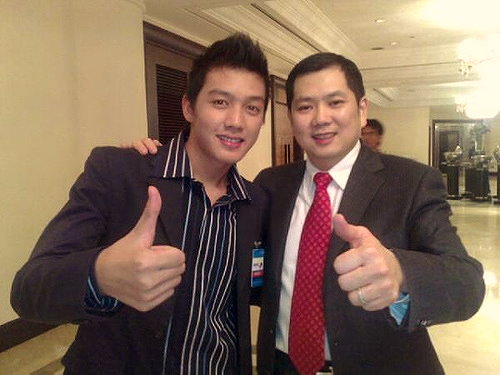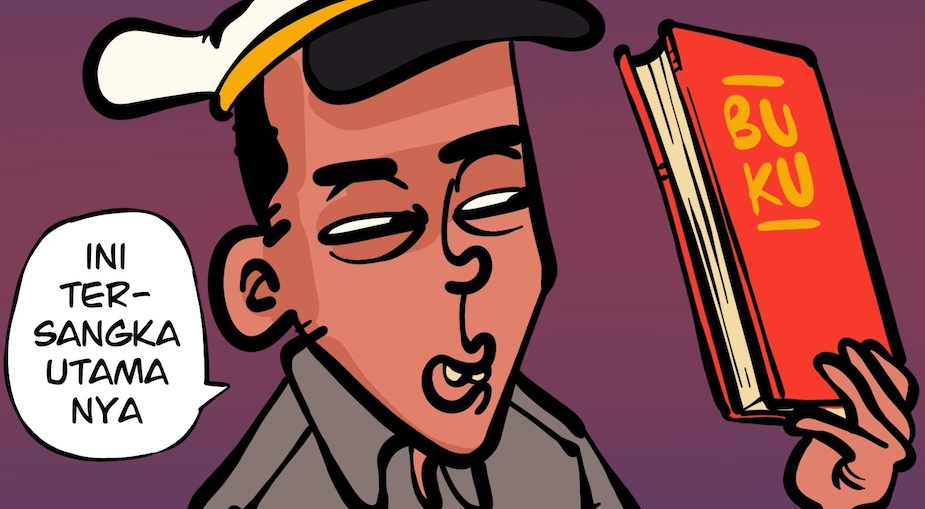What happened to the Suharto-era tycoons? Most are still around
Marleen Dieleman
Harry Tanoesoedibyo (right) and friend, January 2008dirdy (Flickr) |
Most of Indonesia’s largest domestic firms under Suharto’s ‘New Order’ regime came in the form of diversified conglomerates, often controlled by families. Suharto’s crony model for running the economy stimulated large and well-connected groups. Has this situation changed after Suharto was toppled and Indonesia became a democracy? This article argues that the New Order tycoons are still prominent, and offers an explanation for their survival. Suharto’s New Order left a controversial legacy, but in one respect its achievement was outstanding: seven per cent average annual growth throughout its 32 years. A new group of domestic capitalists emerged under Suharto, often stimulated by the government.
Most of Indonesia’s large domestic firms have a few things in common. They tend to be widely diversified conglomerates, they tend to be controlled by families, and most of them belong to tycoons of Chinese descent. Suharto stimulated some of these tycoons because they could be useful in the development of the country, as well as for private and political means. In the process, he created and refined a crony economy in which a Chinese minority had economic power, but could not pose a political threat.
Who were these Suharto-era tycoons? Some were closely connected to Suharto himself, such as Bob Hasan, who had large timber concessions, and Liem Sioe Liong, whose Salim Group became the largest diversified group in Suharto’s Indonesia. Others built their fortunes on local products, such as the tobacco-based Sampoerna and Gudang Garam groups, and yet others manufactured in partnership with foreign firms, such as automotive firm Astra. Other groups exploited Indonesia’s rich resources, or its rich land, such as the Raja Garuda Mas and Sinar Mas groups, active in wood, palm oil and other interests. Two large groups were led by Suharto’s children, namely Tommy Suharto’s Humpuss Group and Bambang Trihadmojo’s Bimantara Group. Of the 20 most prominent business groups in the late 1990s, a large majority only emerged in the Suharto era.
The question now is this: did the close links these New Order tycoons had with Suharto become a liability after his departure? How have they fared since 1998?
Crisis
The demise of the Suharto regime was accompanied by a severe economic crisis, which tested the resilience of the business groups that rose to prominence during the New Order. The Asian Crisis technically bankrupted most Indonesian firms, as imports became prohibitively expensive and loans in US dollars exploded. As most companies defaulted on their loans, the entire banking system collapsed and was bailed out by the Indonesian government. In addition, most family groups had to cope with violence against the ethnic Chinese minority. Once Suharto was ousted, anyone with ties to the New Order came in for popular abuse. The first casualties of the regime change were Suharto family members, who disappeared from the ranks of big business. Most of Suharto’s children kept a low profile, or passed on their shares to friends and nominees. Tommy Suharto was jailed for plotting the murder of a judge who had sentenced him for corruption. Bob Hasan, who had crossed the line from business to politics when he became Industry and Trade Minister two months before Suharto’s resignation, was jailed for corruption and also vanished from the business scene. Some of Bambang’s businesses ended up in the hands of an upcoming tycoon, Harry Tanoesoedibyo.
But the first casualties turned out to be the only ones. Ten years after the Asian Crisis, it is clear that most of the large groups have survived, and are again growing. Despite considerable difficulties in the aftermath of the Asian Crisis, most tycoons have re-organised their trimmed empires and are putting together fresh business deals. Some, such as the Salim Group and the Gajah Tunggal Group, bought back some of the companies that they had been forced to relinquish during the crisis. The recent rankings of the largest family groups in present-day Indonesia, such as those published by the magazines Globe and Forbes, show familiar faces, albeit with a few newcomers such as Harry Tanoesoedibyo (Bhakti Investama) and Chairul Tanjung (Para Group).
Family business groups are a way of doing business that makes sense in an environment with high degrees of uncertainty and weak institutions
How is it possible that the businesspeople who rose to prominence during, and were adapted to, Suharto’s crony regime are now thriving under a new, fundamentally different political constellation? The answer lies partially in corporate adaptation to new circumstances, but largely in the continuity of the business environment, which is still risky, corrupt and without functioning market institutions.
Indonesia is not alone in having large diversified corporate groups. Most Asian countries display this pattern in their business landscape, as indeed do many other emerging markets. In Latin America they are known as the ‘grupos’ and in Korea as ‘chaebols’. Despite the local names, there is something surprisingly universal about diversified business groups: many of these diversified groups are run by families, from the Lee family controlling Samsung in Korea to the Birla family in India.
Suharto stimulated the rise of family groups by handing out favours to a select group of tycoons. But the fact that these groups are common in most emerging economies shows that there are more reasons for their existence than simply Suharto’s fatherly personality. Research suggests that family business groups are predominant in developing markets. Most explanations therefore assume that the developing market environment may have something to do with it. One important theory points to the role of institutions. This refers to rules and regulations ensuring a healthy private sector, such as property rights, a functioning and liquid capital market, a regulated and trustworthy banking sector, a well-trained labour market, norms and values on how to do business, economic policies, and institutions that monitor fair business practices such as anti-monopoly authorities, banking supervision, and so on.
Weak institutions
The theory is that if such institutions in a country are weak, then companies adapt to such circumstances by trying to internalise roles normally played by institutions. For example, if the stock market or banking sector is not functioning well as a source of capital, companies may create an internal capital market. If you own a group of companies, some of which are cash cows, and others of which need new investments, it may be attractive to re-allocate revenues within the group, rather than resorting to outside financing.
If talent is scarce and strangers cannot be trusted, you employ family members and a few trusted managers, who are rotated around the various businesses that the family owns. If property rights cannot be ensured, you may offer some of your land to the military, or shares to a prominent politician, in exchange for protection of your property. In the face of high political or economic risk, companies tend to diversify in different industries and countries, creating elaborate clusters of companies.
Therefore, academics now think that sprawling business groups are a response to and a compensation for weak institutions. Institutional theory claims that family business groups are a way of doing business that makes sense in an environment with high degrees of uncertainty, characterised by weak institutions.
If it is correct that business groups tend to adapt themselves to their environment and form clusters of companies and tight family, business, and political networks, as institutional theory predicts, then a change in environment would have an impact on the shape of the private sector. One would expect that, if public and market institutions became stronger, then large diversified family groups would slowly disappear, as they did in the US and in most of Western Europe.
The transition from dictatorial cronyism to democracy may appear to be a landslide change, but the business environment has not changed fundamentally
But this is not imminent in Indonesia. The business environment has not substantially changed in the areas which institutional theory says are important. While the transition from dictatorial cronyism to democracy may appear to be a landslide change, the business environment has not changed fundamentally. It is perhaps even more risky than under the relative stability of Suharto’s rule.
In present-day Indonesia, connections are still important, and conglomeration has not stopped. An example is the Sampoerna family, which focused on cigarettes for decades, but sold its entire family business in 2005 and started afresh in a range of different industries. Corruption is still ubiquitous, although it is more decentralised and it involves more people. Political ‘investments’ now lead only to short term gains, as the political leaders change more often. As the corruption game spreads, more institutions join in. Unscrupulous businesspeople and politicians can bend most of the rules. Courts and members of parliament can be bought. Managerial talent is scarce and banking scandals are frequent. Trust among strangers is low, and therefore it still pays to hire trusted people, such as family members.
The institutions that stand for a fair market environment in Indonesia, such as the judiciary and parts of the government, are still as weak as they ever were. Worse, perhaps the business environment is now less secure than before. Who better to master these weak institutions than the New Order tycoons themselves? After all, they have thrived in this difficult environment for decades, and their companies are well adapted to it. ii
Marleen Dieleman (marleendieleman@hotmail.com ) is a fellow at the National University of Singapore Business School. She is the author of The Rhythm of Strategy: A Corporate Biography of the Salim Group of Indonesia (Amsterdam University Press, 2007). This article is from a presentation at the Amsterdam conference 'Ten Years After', 22-23 May 2008 (KITLV, University of Amsterdam, Inside Indonesia).












